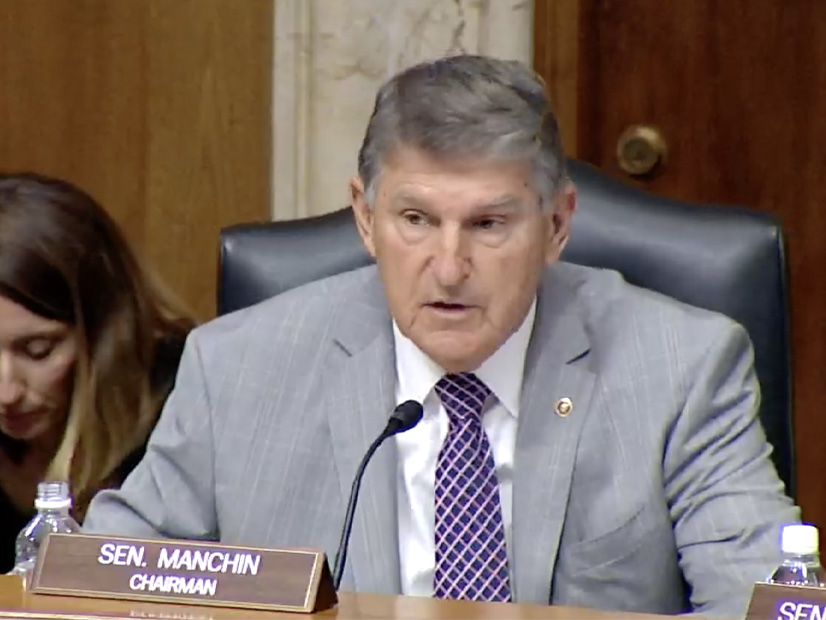The Senate Energy and Natural Resources Committee advanced all three of President Joe Biden’s nominees to FERC with broad margins in a business meeting held June 3.
“Two of the five seats on the commission are already vacant, and a third will expire at the end of the month,” committee Chair Joe Manchin (I-W.Va.) said, referring to Commissioner Allison Clements (D). “Confirmation of these three nominations will ensure that the commission has a full complement of five commissioners continuing important work. I believe all three are well qualified and intend to vote for all three.”
Manchin, while still caucusing with the Democrats, recently left the Democratic Party to become an independent.
Clements’ term expires June 30; if she leaves before a replacement is approved by a floor vote in the Senate and sworn in, FERC could lack a quorum. Commissioners can stay on past their term’s expiration if a replacement has not been confirmed until Congress adjourns at the end of the year, but Clements has not said exactly when she plans to leave.
“By one estimate, the commission regulates activities that account for 7% of our nation’s economy,” committee Ranking Member John Barrasso (R-Wyo.) said. “And for that reason, we must fulfill our responsibility to maintain a quorum on the commission.”
FERC was left without a quorum at the beginning of President Donald Trump’s term for seven months, meaning it could not vote out any orders, and Barrasso said he does not want that situation repeated. He also supported all three nominees.
Several committee members voted against the nominees, but none were in doubt, with both David Rosner and Lindsay See advancing by a 16-3 vote and Judy Chang by 15-4.
FERC must have at least two members who are not in the president’s party; the current makeup is 2-1, with Commissioner Mark Christie the lone Republican.
Rosner is a FERC staffer who was detailed to the ENR Committee and generated opposition from the left, with Sen. Bernie Sanders (I-Vt.) voting against him, despite being backed by the Democrats.
Chang, another Democratic pick, also faced some opposition from Republicans. She is a longtime industry expert who served as undersecretary of energy and climate solutions in former Massachusetts Gov. Charlie Baker’s (R) Executive Office of Energy and Environmental Affairs.
The Republicans put forward See, who is the solicitor general of West Virginia, having argued that state’s and others’ cases against the Obama EPA’s Clean Power Plan, which led to the “major questions” doctrine.
Sen. Josh Hawley (R-Mo.) voted against all three nominees as a protest against the Grain Belt Express transmission line being developed by Invenergy, which could be in a National Interest Electric Transmission Corridor designated by the Department of Energy — giving FERC backstop siting authority over its path through his state. (See On the Road to NIETCs, DOE Issues Preliminary List of 10 Tx Corridors.)
“FERC has the ability to countermand state authorities, essentially to bypass the state regulatory process and designate the land — including potentially taking it,” Hawley said.
At their confirmation hearing, Hawley had asked all three nominees to guarantee they would take into account the interests of local farmers and residents and not “rubber stamp” DOE’s corridors.
“I was particularly disappointed to [hear] the answer of Ms. See, who would not answer my question,” Hawley said. “And I just want to say as a Republican, I’m not going to vote for other Republican nominees who will not stand up to the power grab that is happening all across the country, and of which my state in particular has been a victim.”
In response, Barrasso read off a written answer See had given to that question that will sound familiar to anyone who follows FERC, where its members take pains to avoid stating their opinions on specific cases that come before them to avoid having parties file recusal motions against them.
Hawley “accurately asked” See to exercise caution when approving transmission lines, and she responded she would follow the law, Barrasso said.
“She went on to say, ‘Sensitivity to how federal actions affect state and local communities is essential when making policy decisions,’” Barrasso said. “And she added, ‘I would consider a proposal’s consequences for local landowners important to the public interest analysis.’”




